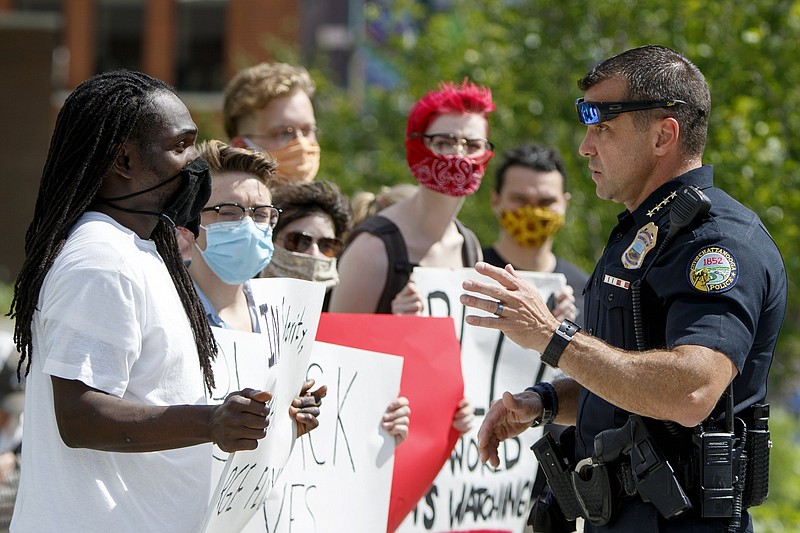In the summer of 2017, Chattanooga lost one important asset and gained another. That was the summer Police Chief Fred Fletcher retired and then-mayor Andy Berke named long-time Chattanooga police veteran David Roddy, Fletcher's chief of staff, as the new chief.
We could not have asked for a better replacement. Fletcher brought the Chattanooga Police Department into 21st century thinking. Roddy has done that and added heartfelt dimension.
Roddy had his work cut out for him. He took over just as social justice upheaval, white nationalism and protests of nationwide police brutality unfolded on Chattanooga streets - much the same as everywhere else in the country as our former president's divisive and brutal tweets helped rub the country raw.
The new chief put forward a number of new community programs such as the School Liaison Program, Handle with Care and Front Porch Lineups - all designed to help officers, children and communities engage in more relaxed ways.
Now Roddy, with 26 years of policing under his belt, has announced his own retirement - a well deserved one since, as one Times Free Press colleague wryly observed, years in police leadership "should be measured like dog years."
In his career, Roddy also has served as acting chief, chief of staff, the captain of multiple divisions and spent 14 years with the department's SWAT team, many of them as the team's commander.
But none of those listings show the real strength of Chief David Roddy.
That would be the Chief Roddy who, on May 27, 2020, two days after George Floyd's Minneapolis death in police custody and the horrifying witness video of it became public, did not form the blue line of silence that we too often see when the latest example of injustice and death is thrust upon us.
With a still photo taken from the witness video, Roddy instead wrote: "There is no need to see more video. There[sic] no need to wait to see how 'it plays out'. There is no need to put a knee on someone's neck for NINE minutes. There IS a need to DO something. If you wear a badge and you don't have an issues with this turn it in."
A few hours later, Hamilton County's Chief Deputy Austin Garrett, a former Chattanooga officer, followed the example and also took to Twitter, writing: "As leaders our communities must know where we stand. This act of violence is black & white. Make no mistake, there's no explanation or gray in it. For 8 min George Floyd lay suffocating and dying. If you wear a badge stand up for what's right & stand up & speak out against wrong."
Their tweets went viral, of course, and not all of the response was positive.
That would be the same Chief Roddy who, each night of the hot and frightening late May and early June protests here, went out to personally talk with protesters "in the middle of Frazier Avenue at 2:30 in the morning."
That would be Chief Roddy who understood that Floyd's needless death wasn't the only thing Americans and Chattanoogans, black and white, were protesting, but he also knew the vagaries of our anger and discontent were lost on many because having those vital conversations always are packed with the baggage we all carry about race.
He took the conversations - rather than fires, beatings or worse - in the middle of Frazier Avenue to a meeting of the City Council one evening in June. After Roddy's lengthy report, Council Chairman Chip Henderson, District 1, and other council members asked the chief what the city and police department needed right then.
Roddy's answer was simple and to the point. Keep having conversations.
"In the middle of Frazier [Avenue], a gentleman asked me what have you done to bring about change," Roddy told the council. "My response was 'nothing.' You don't want me to do that by myself. I can design all the solutions in the world, but if the people most affected aren't part of that solution, then I've failed it. ... I can fix all the burnt out streetlights I want, but if I don't get the one over your house you could care less about the other 10. ... That's the conversations we need to be having."
Now at 50, Roddy wants to dedicate time to himself and his own family.
Yes, there is some buzz - we believe false - that Roddy was rushed out by the new mayor, Tim Kelly, who has acknowledged that he's been pressured by community leaders including a coalition of Black clergy members calling for the appointment of a person of color to the position of chief. But Kelly had pointedly said he would not look to replace Roddy.
"He's done a great job in challenging times, and there's no reason. I've given my word. I think he's the right guy," Kelly said in March during the mayoral campaign.
On Monday after Roddy resigned, Kelly said he will open the search for a new chief to candidates nationwide to find the best replacement. But he is sad to see Roddy go.
"I was especially proud of his leadership last summer as he engaged in peaceful dialogue with residents attending protests every night, working to listen and to learn from our community. Moreover, as chief he has invested in innovative solutions and community engagement to reduce crime, clear cases and protect our residents," Kelly said.
We are proud of Roddy, too. He leaves big shoes to fill. We wish him a wonderful retirement.
